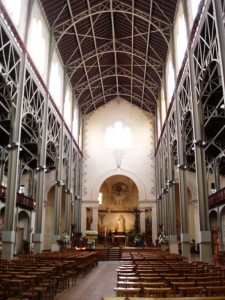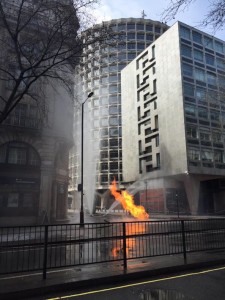The destruction by the Troika of the Greek economy and Greek society that we have witnessed these last five years may have one good outcome: it may bring reform to at least one of the organizations responsible, according to this scathing indictment by Ambrose Evans-Pritchard in the London Telegraph today. An excerpt:
The International Monetary Fund is in very serious trouble. Events have reached a point in Greece where the Fund’s own credibility and long-term survival are at stake.
The Greeks are not withholding a €300m payment to the IMF because they have run out of money, though they soon will do.
Five key players in the radical-Left Syriza movement – meeting in the Maximus Mansion in Athens yesterday – took an ice-cold, calculated, and carefully-considered decision not to pay.
They knew exactly what they were doing. The IMF’s Christine Lagarde was caught badly off guard. Staff officials in Washington were stunned.
On one level, the “bundling” of €1.6bn of payments due to the IMF in June is just a technical shuffle, albeit invoking a procedure last used by Zambia for different reasons in the 1980s. In reality it is a warning shot, and a dangerous escalation for all parties.
Syriza’s leaders are letting it be known that they are so angry, and so driven by a sense of injustice, that they may indeed default to the IMF on June 30 and in so doing place the institution in the invidious position of explaining to its 188 member countries why it has lost their money so carelessly, and why it has made such a colossal hash of its affairs.
The Greeks accuse the IMF of colluding in an EMU-imposed austerity regime that breaches the Fund’s own rules and is in open contradiction with five years of analysis by its own excellent research department and chief economist, Olivier Blanchard.
Greece’s public debt is 180pc of GDP. The loans are in a currency that the country does not control. It is therefore foreign currency debt. The IMF knows that Greece cannot possibly pay this down by draconian austerity – the policy already implemented for five years with such self-defeating effects – and the longer it pretends otherwise, the more its authority drains away.
It is has pushed for debt relief behind closed doors but only half-heartedly, unwilling to confront the EMU creditor powers head on. Objectively, it is acting as an imperialist lackey – as Greek Marxists might say.
Indeed, it has brought about the worst possible outcome. The Fund’s man on the ground in Athens – Poul Thomsen – has pushed the austerity agenda with a curious passion that shocks even officials in the European Commission, pussy cats by comparison.
This would be justifiable (sort of) if the other side of the usual IMF bargain were available: debt relief and devaluation. This how IMF programmes normally work: impose tough reforms but also wipe the slate clean on debt and restore crippled countries to external viability.
It is a very successful formula. On the rare occasion when the IMF goes wrong it is usually because it tries to prop up a fixed-exchange rate long past its sell-by date.
All of this went out of the window in Greece. The IMF enforced brute liquidation without compensating stimulus or relief. It claimed that its policies would lead to a 2.6pc contraction of GDP in 2010 followed by brisk recovery.
What in fact happened was six years of depression, a deflationary spiral, a 26pc fall in GDP, 60pc youth unemployment, mass exodus of the young and the brightest, chronic hysteresis that will blight Greece’s prospects for a decade to come, and to cap it all the debt ratio exploded because of the mathematical – and predictable – denominator effect of shrinking nominal GDP.
It is a public policy scandal of the first order. One part of the IMF has issued a mea culpa admitting that its own analysts misjudged the fiscal multiplier badly. Plaudits to them.
Another part of the Fund continues to push new variants of the same indefensible policies, demanding a combined fiscal squeeze from pension cuts and VAT rises equal to 1pc of GDP this year and 2pc next year even as the economy lurches back into recession.
Ashoka Mody, former chief of the IMF’s bail-out in Ireland, refuses to criticise his former colleagues on the European desk, but the meaning of the words I quoted last night are clear enough.
“Everything that we have learned over the last five years is that it is stunningly bad economics to enforce austerity on a country when it is in a deflationary cycle. Trauma patients have to heal their wounds before they can train for the 10K.”
“I am frankly shocked that we are even having a discussion about raising VAT at all in these circumstances. We have just seen a premature rise in VAT knock the wind out of a country as strong as Japan.”
“Syriza should recruit the IMF’s research department to be their spokesman because they are saying almost exactly the same thing as Syriza on the economics of this. The entire strategy of the creditors is wrong and the longer this goes on, the more is its going to cost them.”
The IMF’s Original Sin in Greece was to allow the urbane Parisian Dominique Strauss-Kahn to hijack the institution to prop up Europe’s monetary union and the European banking system when the crisis erupted in 2010.
The Fund’s mission is to save countries, not currencies or banks, and it certainly should not be doing dirty work for a rich currency union that is fully capable of sorting out its own affairs, but refuses to do so for political reasons.
It was of course a difficult moment in May 2010. The eurozone was spinning out of control. There were no backstop defences – due to the criminal negligence of Europe’s leaders and banking regulators – and fears of a euro-Lehman were all too real.
Yet leaked minutes from the IMF board meetings showed that all the emerging market members (and Switzerland) opposed the terms of the first loan package for Greece. They protested that it was intended to save the euro, not Greece.
It loaded yet more debt onto the crushed shoulders of an already bankrupt country, and further complicated the picture by allowing one large French bank and one German bank – no names please – to offload much of their €25bn combined exposure onto EMU taxpayers.
“Debt restructuring should have been on the table,” said Brazil’s member. The loans “may be seen not as a rescue of Greece, which will have to undergo a wrenching adjustment, but as a bailout of Greece’s private debt holders, mainly European financial institutions”.
Arvind Virmani, India’s member, was prophetic. “The scale of the fiscal reduction without any monetary policy offset is unprecedented. It is a mammoth burden that the economy could hardly bear,” he said.
“Even if, arguably, the programme is successfully implemented, it could trigger a deflationary spiral of falling prices, falling employment and falling fiscal revenues that could eventually undermine the programme itself.” This is exactly what has happened.
The Fund might have atoned later by acknowledging its special duty of care towards Greece and softening the terms. It did not do so. We should hardly be surprised if Syriza is now on the warpath.
The IMF needs to be careful. It has itself become an emblem of bad governance. Mr Strauss-Kahn was caught in flagrante delicto, only to be replaced instantly in a political stitch-up by another French finance minister (of quality and integrity – but that is not the point). Mr Strauss-Kahn’s predecessor was recently indicted in Spain for fraud.
The institution cries out for reform. There is no justifiable reason why the job of managing-director should go by divine right to a European, nor why the Europeans still control eight seats on the IMF board.
. . .
These anomalies should have been sorted out at the time of the Strauss-Kahn debacle – along with quota reform blocked by the US Congress – all the more so since China and a host of rising reserve powers were already bursting onto the scene by then.
Leadership failed. The West disgraced itself. No wonder Asia is now going its own way with a rival set of bodies.
Greece’s firebrand government is bringing matters to a head for an institution already in trouble, but one with a superb staff and still worth saving.
Mrs Lagarde must stop playing the role of a diplomat. She must take off her European hat and speak instead for the organisation she leads and for the world.
She must confront the EMU creditors head on and in public. She must tell them, in blunt language, that they share much of the blame for the current impasse.
She must make it clear to them that Greece needs sweeping debt relief – as a matter of economic science, whatever the morality – and that the refusal of the creditors to face up to this elemental fact is now the chief impediment to a solution. And she should tell them that the IMF will no longer play any part in their deceitful charade.
If she does not do so, and if the lack of leadership by Europe’s political class leads to a catastrophic denouement on every level, then let it be on her head too.


